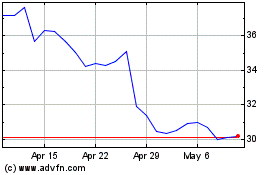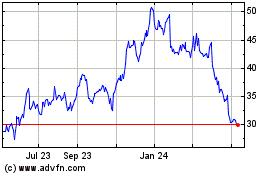U.S. Consumers Predict Unprecedented Connectivity in 2025, but Security and Privacy Concerns Linger
September 16 2014 - 6:00AM
Business Wire
McAfee Study Reveals Consumer Attitudes on
Future Lifestyle and Technology Trends
Today, McAfee, part of Intel Security, has released findings
from its Safeguarding the Future of Digital America in 2025
study, which examines the thoughts and attitudes of more than 1,500
U.S. consumers about lifestyle and technology trends. The study
provides insights into how technology impacts people’s homes,
workplace, cars, wearables, mobile devices and how these
technologies intersect with their online security and privacy.
U.S. consumers believe that in the coming decade, technology and
devices will drastically improve the experience of managing their
home. Nearly three out of five people plan to have been to a
house that speaks or reads to them in 11 years. More than 60
percent think their refrigerator will automatically add food to
a running grocery list if the product is running low. The majority
of consumers (84 percent) are convinced their home security
systems will be connected to their mobile device.
“As technology, especially the Internet of Things, continues to
rapidly advance and increasingly connect our everyday lives, we
understand consumers are concerned about how these changes will
impact their safety and privacy,” said Gary Davis, chief consumer
security evangelist at McAfee. “With this study, we hope to shine a
light on these matters and expectations so industry can best
integrate new innovations with consumer’s online security and
privacy in mind.”
Among other highlights, the research provides insight into how
Americans view cybersecurity, wearables and their means of
transportation in 2025.
Cybersecurity
According to the survey, 68 percent of Americans are
concerned about what the state of cybersecurity will be 11 years
from now. Nearly two-thirds of consumers (64 percent) stated
identity theft, monetary theft and fraud as the biggest concerns.
This is not surprising given the near-daily reports about retail
and financing institutions being hacked. With new innovations
arising every day to make consumers’ lives increasingly connected,
Americans may feel hesitant in sharing personal information or
adopting these technologies in fear of becoming a victim of a
cybercrime.
Cybercrime
The study also revealed that as many as 77 percent of
consumers fear their families could fall victim to hackers over the
next decade. Almost half (46 percent) believe their families
will be affected by cyberbullies in 2025. With the number of social
networking sites and the people who frequent them growing, the
likelihood of consumers experiencing negative encounters online
increases.
“As concerns about security rise, we will likely shift in the
ways in which we provide authentication,” said Ross Dawson,
futurist and author. “This may include using unique biometric
information, potentially including our fingerprints, faces, voices,
eyes, or even thought waves.”
“People have just started to understand that their personal data
is not some ethereal thing,” said Brian Johnson, Intel futurist.
“They haven’t quite figured out what’s appropriate for others to
know about that data. For instance, we don’t blurt out our credit
card information when we walk into a room. Why would we want our
data to do that online?”
Wearables
Seventy-seven percent of consumers think the most common
device in 11 years will be a smart watch and 70 percent
respondents believe overall wearable devices will be commonly used.
Seventy-two percent of consumers anticipate connected
kitchen appliances will be a household item.
“It’s clear that in 2025, consumers will be expecting more from
their devices. The introduction of wearables and other artificial
intelligence will help simplify our lives,” continued Davis. “While
Americans look forward to more convenience, they also understand
the importance of balancing this convenience with the need to feel
safe.”
Tech in the Workplace
In the next decade, U.S. consumers anticipate seeing significant
changes in their places of employment. While one in three (29
percent) of working consumers think they will be working from a
home office, 60 percent envision artificial intelligence and
robotics assisting with their job tasks. Sixty-nine percent
believe they will be able to access work data through facial or
voice recognition. While it is likely that greater precautions will
be taken to ensure sensitive work information remains secure,
robotics in the workplace may result in companies being more
susceptible to cyber-related crimes.
“It is vital that Americans recognize that the world of work
will be dramatically different within a decade, in changing
workplaces, the role of robots, and the importance of online
reputation,” said Dawson. “We will all need to be very careful to
ensure that our online activities boost rather than detract from
our professional reputations.”
Other key findings
include:
Cover Your Digital Assets
- By 2025, 38 percent of U.S.
consumers expect to unlock their mobile device by eye scan followed
by a thumbprint. Almost all of respondents (90 percent) plan
to put more effort into protecting their digital assets in the
future after taking the survey.
Pay by Phone…or Fingerprint
- One in three consumers believes
they will be able to pay for items using their fingerprint while
22 percent anticipate they will use their mobile device.
More than a quarter of respondents (26 percent) plan to
still pay by credit or debit card.
Green Means Go
- Thirty-five percent of people
think Americans will get around by a hybrid vehicle or a
self-driving car (26 percent) in 2025. More than 60
percent of consumers think there will be car models available
in 2025 that will be completely autopilot.
Your App Will Know Best
- Seventy percent of consumers
believe a wearable device will send health vitals directly to their
physician, saving a visit to the doctor’s office. More than one
in three (31 percent) people think there will be an online
digital health check with sensors running over their bodies to
relay signs of illness.
To learn more, please visit:
- Blog post by Gary Davis:
http://blogs.mcafee.com/consumer/the-future-of-tech
- Blog post by Robert Siciliano:
http://blogs.mcafee.com/consumer/connected-technology
- Infographic:
http://images.mcafee.com/infographic/StateofDigitalAmerica.html
- Press release:
http://www.mcafee.com/us/about/news/2014/q3/20140916-02.aspx
- Join the discussion on Twitter
@McAfeeConsumer using #FutureTech
Quantitative Methodology
MSI Research conducted an online survey among 1,507 U.S.
citizens ages 21 to 65. The survey was split evenly among age and
gender. The interviews were conducted from August 1 - August 12,
2014.
About McAfee
McAfee, part of Intel Security and a wholly owned subsidiary of
Intel Corporation (NASDAQ: INTC), empowers businesses, the public
sector, and home users to safely experience the benefits of the
Internet. The company delivers proactive and proven security
solutions and services for systems, networks, and mobile devices
around the world. With its visionary Security Connected strategy,
innovative approach to hardware-enhanced security, and unique
global threat intelligence network, McAfee is relentlessly focused
on keeping its customers safe. http://www.mcafee.com
Note: McAfee is a registered trademark of McAfee, Inc. in the
United States and other countries. Other names and brands may be
claimed as the property of others.
McAfeeKim Eichorn, 408-455-2172kim_eichorn@McAfee.comorDKCEva
Ross, 212-981-5218eva_ross@dkcnews.com
Intel (NASDAQ:INTC)
Historical Stock Chart
From Mar 2024 to Apr 2024

Intel (NASDAQ:INTC)
Historical Stock Chart
From Apr 2023 to Apr 2024
